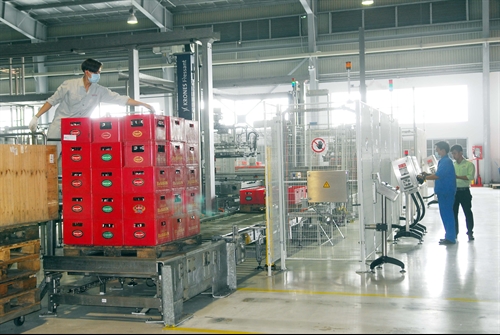 Economy
Economy

Health activists say special consumption taxes imposed on alcohol, beer and tobacco should be increased to improve community health and tackle the national budget deficit.
 |
| Health activists say that taxes on beer, alcohol and tobacco should be raised to limit consumption. - VNA/VNS Photo Mạnh Linh |
HÀ NỘI – Health activists say special consumption taxes imposed on alcohol, beer and tobacco should be increased to improve community health and tackle the national budget deficit.
Special consumption taxes were meant to limit the consumption of products harmful to consumers. But alcohol, beer and tobacco remain cheap and easy to buy in a local market, experts said at a forum about special consumption tax and community health held on Monday.
Nguyễn Tuấn Lâm from the World Health Organisation (WTO) in Việt Nam was quoted by infonet.com as saying that increasing tax would be a win-win solution for both the Government and citizens, amid heavy budget deficits. Citizens could potentially avoid diseases caused by consuming those products. And the national budget would have more revenue sources. Experience in Thailand and the Philippines had proven this, Lâm said.
Experts said at the forum that the increases in special consumption taxes on alcohol, beer and tobacco which followed the amended Law on Special Consumption Tax 2014 were not high enough.
For example, the tax rate on tobacco increased from 65 per cent to 70 per cent at the beginning of this year. This tax rate will increase to 75 per cent on January 1, 2019. This would make the retail price of tobacco increase by around 2.9 per cent and 2.8 per cent, respectively. Excluding inflation, the average increase totalled just one per cent per year from 2015 to after 2020, compared to an average economic growth rate of five per cent.
In other words, the price of tobacco would decrease over the years, as would the prices of alcohol and beer, one expert explained. So the special consumption tax will fail to discourage consumption.
“Increasing the special consumption tax is necessary to limit consumption”, said economic expert Lê Đăng Doanh.
Phạm Thị Hoàng Anh, director of Health Bridge Việt Nam, said that beer and alcohol caused 5.7 per cent of deaths and 4.7 per cent of disease burden measured by disability-adjusted life year (DALY), while tobacco accounted for 16.9 per cent of deaths and 8.8 per cent of disease burden.
Cheap tobacco, alcohol and beer was the number one cause for rampant consumption, especially in rural areas of Việt Nam. This negatively impacted community health and caused economic and social burdens, Hoàng Anh said quoted by the infonet.
The news website also reported that on Monday several non-Government organisations sent a document to the National Assembly and several Government agencies, regarding their agreements as to the calculation of special consumption tax as regulated in the new rules which went into effect on January 1, 2016.
The calculation of the tax is expected to push up retail prices of tobacco, alcohol and beer by 2.7 per cent. This would help increase budget revenue, while limiting consumption of those products, experts said.
But beverage companies want to delay the application of amended regulations on calculating special consumption tax until the beginning of 2017. They say they need time to adapt because the new legal amendments pose challenges for them.
So far, the special consumption tax - with 60 per cent coming from tobacco, alcohol and beer - contributed around seven per cent to the budget, according to Hà Huy Tuấn, Deputy Chairman of the National Financial Supervisory Committee - VNS




